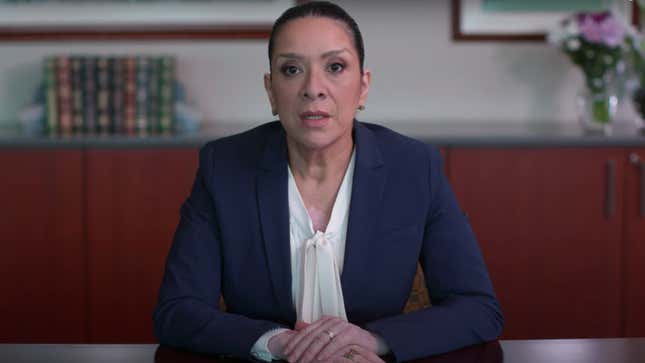
U.S. District Judge Esther Salas, whose son Daniel was murdered and husband critically injured, allegedly by a men’s rights activist unhappy with a verdict, has issued her first public statement since the July 19 shootings at her home.
In the nine-minute video, Salas, who appears grief-stricken but composed, describes the events leading up to her son’s murder. The weekend of the shooting she says she’d hosted some friends of her son, Daniel, for a weekend at their New Jersey home in honor of his 20th birthday. On Sunday morning, Salas and her husband, Mark Anderl, let Daniel sleep in as they attended mass. She says she and Daniel were cleaning up after their guests when Roy Den Hollander, disguised as a FedEx driver, rang their doorbell: “Mom, let’s keep talking,” were Daniel’s last words, according to Salas, before leaving her to answer the door. “I love talking to you, Mom”
She says Den Hollander fatally shot Daniel in the chest as he attempted to block access to his father with his own body. Hollander then proceeded to shoot Anderl three times. He is still being treated for his injuries but is expected to recover.
Hollander likely targeted her family, according to Salas, because she’d recently ruled against a lawsuit he’d filed challenging mandatory conscription for U.S. men. Police believe he is also responsible for the murder of fellow men’s right’s activist Marc Angelucci, who had been more successful with a similar lawsuit in California. Additionally, Den Hollander, who died by suicide following the murders, had crafted a list of other judges and oncologists, including one who had treated him for terminal cancer, as well as a 2,000-page manifesto decrying the influence of “feminazis” on American culture.
In her statement, Salas doesn’t speculate as to Den Hollander’s motivations for allegedly murdering her only child and shooting her husband, but does address the fact that the attack perhaps couldn’t have taken place if it weren’t so easy to find personal information about judges online in the first place:
“We are forced to live in fear for our lives because personal information, like our home addresses, can be easily obtained by anyone seeking to do us or our families harm,” Salas said. “Currently, federal judges’ addresses and other information is readily available on the Internet. In addition, there are companies that will sell your personal details that can be leveraged for nefarious purposes.”
Because of the abundance of easily accessible information, Salas says that Den Hollander was able to compose a “dossier” on her family, including the name of their church and their home address. Salas called for “national dialogue” to “safeguard the privacy of federal judges.” Salas also addressed the fact that the problem is a complicated one with no easily apparent solutions before seeming to rightly worry about whether Den Hollander will create a dangerous new model for other men’s rights shitbags who seem incapable of experiencing anger without murdering anyone:
“This is a matter of life and death,” Salas said. “And we can’t just sit back and wait for another tragedy to strike.”